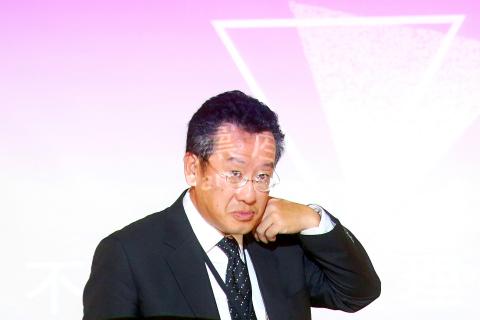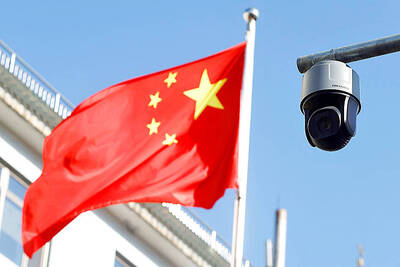The Chinese Nationalist Party’s (KMT) ties with China and its unwillingness to abandon its legacy pose challenges to transitional justice, Ill-gotten Party Assets Settlement Committee Chairman Wellington Koo (顧立雄) said yesterday.
Speaking in Taipei at an event on transitional justice, Koo said the KMT is much stronger than East Germany’s ruling Socialist Unity Party of Germany (SED), to which it is often compared in reference to transitional justice.
Saying that the essence of transitional justice is seeking historical facts, reconciliation and justice, Koo expressed dismay at what he called resistance to such efforts in Taiwan, adding that the pursuits are often misinterpreted as political conflict.

Photo: CNA
Justice must be pursued in a timely fashion to prevent the efforts from losing steam, Koo said.
Comparing the KMT with the SED, Koo said both parties have reacted similarly to investigations into their assets by filing lawsuits at every step, adding that Germany’s party assets investigation committee tirelessly persisted in the face of these obstructions.
“However, Taiwan and Germany have three major differences: Records were dug up immediately following the collapse of East Germany ... but here the records were lost. [In Taiwan] assets were concentrated in the hands of a few following democratization ... [and] the KMT is much more powerful than the SED was,” Koo said.
Koo said the KMT differs from the SED in that it has its own media outlets that voice its position on the issue of unification with China.
Transitional justice measures in post-unification Germany differed greatly in that they did not face the same issues when dealing with the legacy of an authoritarian party, Koo said.
Even after Taiwan transitioned from a nation where protests were violently suppressed, the KMT continued to hold executive, legislative and judicial power, Koo said, adding that obstructions to transitional justice are the natural outcome of that situation.
In that situation “there will never be a judge who says: ‘I completely understand transitional justice,’” Koo said.
He said that the KMT once “sat atop a pedestal,” adding that it can only understand the will of the public when it is on the same level as other parties.
Koo cited the KMT’s previous annual personnel expenses, which were as high as NT$3.2 billion (US$104.4 million), adding that the party’s current staff of 300 is more reasonable for a political party.
Aside from the investigation into its assets, the KMT must face up to its past, Koo said, adding that even the removal of a statue of Chiang Kai-shek (蔣介石) in Tainan was marred with protests.
“However, I believe everything should be fine; we just need to take it one step at a time,” Koo said.

POLAM KOPITIAM CASE: Of the two people still in hospital, one has undergone a liver transplant and is improving, while the other is being evaluated for a liver transplant A fourth person has died from bongkrek acid poisoning linked to the Polam Kopitiam (寶林茶室) restaurant in Taipei’s Far Eastern Sogo Xinyi A13 Department Store, the Ministry of Health and Welfare said yesterday, as two other people remain seriously ill in hospital. The first death was reported on March 24. The man had been 39 years old and had eaten at the restaurant on March 22. As more cases of suspected food poisoning involving people who had eaten at the restaurant were reported by hospitals on March 26, the ministry and the Taipei Department of Health launched an investigation. The Food and

The long-awaited Taichung aquarium is expected to open next year after more than a decade of development. The building in Cingshui District (清水) is to feature a large ocean aquarium on the first floor, coral display area on the second floor, a jellyfish tank and Dajia River (大甲溪) basin display on the third, a river estuary display and restaurant on the fourth, and a cafe and garden on the fifth. As it is near Wuci Fishing Port (梧棲漁港), many are expecting the opening of the aquarium to bring more tourism to the harbor. Speaking at the city council on Monday, Taichung City Councilor

A fourth person has died in a food poisoning outbreak linked to the Xinyi (信義) branch of Malaysian restaurant chain Polam Kopitiam (寶林茶室) in Taipei, Deputy Minister of Health and Welfare Victor Wang (王必勝) said on Monday. It was the second fatality in three days, after another was announced on Saturday. The 40-year-old woman experienced multiple organ failure in the early hours on Monday, and the family decided not to undergo emergency resuscitation, Wang said. She initially showed signs of improvement after seeking medical treatment for nausea, vomiting and diarrhea, but her condition worsened due to an infection, he said. Two others who

Taiwanese should be mindful when visiting China, as Beijing in July is likely to tighten the implementation of policies on national security following the introduction of two regulations, a researcher said on Saturday. China on Friday unveiled the regulations governing the law enforcement and judicial activities of national security agencies. They would help crack down on “illegal” and “criminal” activities that Beijing considers to be endangering national security, according to reports by China’s state media. The definition of what constitutes a national security threat in China is vague, Taiwan Thinktank researcher Wu Se-chih (吳瑟致) said. The two procedural regulations are to provide Chinese